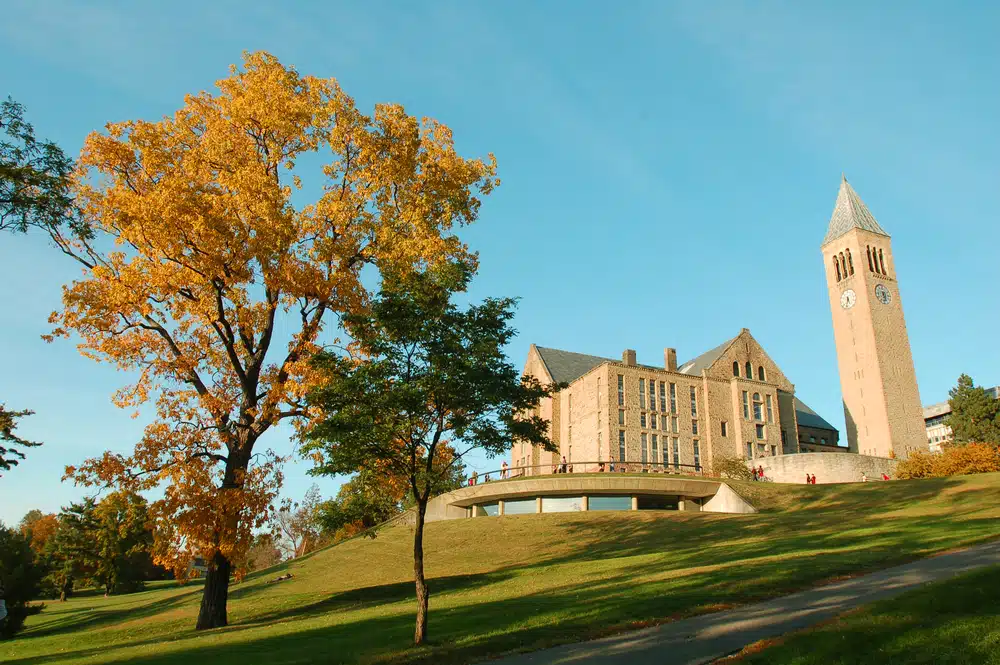Everything You Need To Know About Cornell University Admissions
Cornell University admissions are often touted as the gateway to an unparalleled journey of intellectual curiosity, interdisciplinary learning, and engagement with one of the most prestigious institutions in the world.
Cornell University is a variety of colleges and schools, so whether you’re interested in agriculture, architecture, liberal arts, business, or engineering, Cornell has something for you! In this article, we’ll detail everything you need to know about Cornell University admissions process, so let’s get started!
A Comprehensive Overview of Cornell University
Cornell University is a private Ivy League research university located in Ithaca, New York. It was founded in 1865 by Ezra Cornell and Andrew Dickson White and has since grown into one of the most prestigious universities in the world. Cornell is known for its exceptional academic programs, distinguished faculty, and beautiful campus.
The university is home to over 23,600 undergraduate, graduate, and professional students from all 50 states and over 120 countries. Cornell has a diverse student body and is committed to fostering a welcoming and inclusive community.
Cornell is divided into seven different undergraduate colleges and schools, each with its own unique academic focus. These schools include:
- College of Agriculture and Life Sciences (CALS): CALS is one of the leading colleges of its kind in the world. It offers a wide range of programs in agriculture, life sciences, and related fields.
- College of Architecture, Art, and Planning (AAP): AAP is a unique college that combines the study of architecture, art, and urban planning. It is known for its innovative programs and cutting-edge research.
- School of Industrial and Labor Relations (ILR): ILR is the only school of its kind in the world. It focuses on the study of work, employment, and labor relations.
- S.C. Johnson College of Business: The Johnson College of Business is one of the top business schools in the world. It offers a wide range of programs in business, management, and related fields.
- College of Engineering: The College of Engineering is one of the largest and most prestigious engineering schools in the world. It offers a wide range of programs in engineering, computer science, and related fields.
- College of Arts and Sciences (A&S): A&S is the largest college at Cornell and offers a wide range of programs in the humanities, social sciences, and natural sciences.
- Graduate School: The Graduate School offers advanced degrees in a wide range of fields, including the humanities, social sciences, natural sciences, and engineering.
Once you get past Cornell University admissions, you’ll see that this prestigious institution is also known for its cutting-edge research. The university is home to over 100 research centers and institutes, including the Cornell Lab of Ornithology, the Cornell Center for Materials Research, and the Cornell Center for Advanced Computing.
Cornell’s campus is located in the heart of the Finger Lakes region of New York, known for its natural beauty and outdoor recreation opportunities. The campus itself is a mix of historic and modern buildings, with stunning views of Cayuga Lake and the surrounding hills.
Overall, Cornell University is a world-class institution that offers exceptional academic programs, a diverse and welcoming community, and unparalleled research opportunities.
The Application Process
Applying to Cornell involves a few different steps, so let’s break it down:
Before we dive into the details of the application process, let’s take a moment to appreciate the history and prestige of Cornell University. Founded in 1865, Cornell is a private Ivy League research university located in Ithaca, New York. With a sprawling campus spanning over 2,300 acres, Cornell is home to over 23,000 undergraduate and graduate students from all over the world. The university is known for its exceptional academic programs, distinguished faculty, and commitment to research and innovation.
Application Deadlines
Cornell University admissions have two different application deadlines for prospective undergraduate students. Early Decision applications are due by November 1st, while Regular Decision applications are due by January 2nd. It’s important to note that Early Decision is binding, meaning that if you’re accepted, you have to attend Cornell. Regular Decision, on the other hand, is non-binding.
It’s important to carefully consider which application deadline is right for you. Early Decision can be a great option if Cornell is your top choice and you’re confident in your ability to meet the academic and financial requirements. However, if you’re still exploring your options or need more time to prepare your application, Regular Decision may be a better fit.
Required Documents and Materials
In addition to the Common Application or Universal College Application, Cornell requires the following materials:
- Transcripts from all high schools attended
- Standardized test scores from the SAT or ACT (Writing recommended)
- Two teacher evaluations (if applying for first-year admission)
- A mid-year transcript (if applying for Regular Decision)
It’s important to note that these materials are just the basics. To make your application stand out, you may want to consider submitting additional materials that showcase your talents and achievements. For example, if you’re a talented musician, you may want to submit a recording of your performance. Or if you’re an aspiring writer, you may want to include a sample of your work.
Optional Materials
In addition to the required materials, Cornell also accepts a variety of optional materials, including:
- A resume
- An art portfolio (if applying to the College of Architecture, Art, and Planning)
- An interview (recommended for both Early and Regular Decision applicants)
While these materials are optional, they can provide valuable insight into your interests and accomplishments. If you have a unique talent or experience that you think would be relevant to your application, don’t hesitate to share it!
Personal Statement and Essays
Your personal statement is a key part of your application to Cornell University admissions. It’s your chance to explain your personal background, academic interests, and extracurricular activities. The Common Application essay is a good starting point, but Cornell also requires a supplemental essay specific to each college or school you’re applying to. Make sure to carefully review and proofread your essays before submitting them.
When crafting your personal statement and supplemental essays, it’s important to be authentic and genuine. Admissions officers are looking for students who will contribute to the Cornell community, so make sure to highlight your unique strengths and experiences.
Standardized Test Scores
Cornell is a test-optional institution for the 2021-2022 application cycle. If you have taken the SAT or ACT, you can submit your scores, but they are not required. If you choose to submit scores, you may self-report them on your application, or you may send official scores directly from the testing agency.
This test-optional policy reflects Cornell’s commitment to holistic admissions. Admissions officers will consider a variety of factors when evaluating your application, including your academic record, essays, recommendations, and extracurricular activities.
Letters of Recommendation
Cornell requires two teacher recommendations, and you may also submit an additional recommendation from a counselor, coach, or other person who knows you well. It’s important to choose recommenders who know you academically and personally, so they can provide the admissions committee with a comprehensive picture of your abilities and character.
When asking for letters of recommendation, make sure to give your recommenders plenty of time to write and submit their letters. It’s also a good idea to provide them with a copy of your resume and personal statement, so they can better understand your goals and achievements.
Overall, the application process can be challenging and time-consuming, but it’s also an opportunity to showcase your unique talents and achievements. By carefully preparing your application materials and highlighting your strengths, you can increase your chances of being admitted to Cornell University.
Understanding Cornell University Admissions Criteria
Do you know what Cornell looks for in its applicants? Here are some factors that the admissions committee considers:
Academic Performance
Your academic achievements are a crucial part of your application. Cornell wants to see that you’ve challenged yourself in high school by taking advanced courses, such as AP or IB classes, and that you’ve achieved good grades in those courses. Strong scores on standardized tests, like the SAT or ACT, are also important, but remember, they’re optional for the 2021-2022 application cycle.
It’s important to note that Cornell doesn’t just look at your grades and test scores in a vacuum. They also consider the context of your academic performance. For example, if you had to overcome significant challenges in your personal life or at school, Cornell wants to know about it. They understand that not all students have the same opportunities or resources, and they want to give everyone a fair chance to succeed.
Extracurricular Activities
Academic performance isn’t the only thing Cornell considers when reviewing your application. Your extracurricular activities, such as sports, clubs, volunteer work, and internships, can also give the admissions committee insight into your character, interests, and passions. It’s better to have a few meaningful, sustained activities than a laundry list of short-lived ones, so make sure to emphasize your impact and leadership in your chosen activities.
But what if you don’t have a lot of extracurricular activities? Don’t worry, Cornell isn’t looking for well-rounded students, they’re looking for well-lopsided students. In other words, they want students who have a deep passion or talent in one or two areas, rather than students who try to do everything and end up spreading themselves too thin. So if you have a unique hobby or interest, don’t be afraid to showcase it in your application.
Demonstrated Interest
Cornell wants to admit students who are genuinely interested in attending the university, so they pay attention to how you interact with the school throughout the admissions process. Visiting campus, attending information sessions, and interviewing with alumni or admissions representatives can all demonstrate your interest in Cornell.
But what if you can’t visit campus or attend an information session? Don’t worry, there are other ways to demonstrate your interest. For example, you can reach out to current students or alumni through social media or email and ask them questions about their experiences at Cornell. You can also research the school thoroughly and mention specific programs, professors, or initiatives that align with your interests in your application.
Diversity and Inclusivity
The Cornell University admissions committee values a diverse student body and seeks out applicants from a wide range of backgrounds and experiences. Your personal statement and supplemental essays are a good place to highlight how your identity, culture, or background has shaped your perspective and passion.
But diversity isn’t just about checking boxes or quotas. Cornell wants to create a community where students can learn from each other and challenge each other’s perspectives. So if you have a unique perspective or experience, don’t be afraid to share it. And if you don’t, that’s okay too. You can still contribute to a diverse and inclusive community by being open-minded, respectful, and willing to learn from others.
Cornell’s Colleges and Schools
Cornell University is a world-renowned institution that offers a wide range of academic programs for undergraduate students. The university is home to seven different colleges and schools, each with its own unique focus and approach to education.
College of Agriculture and Life Sciences
The College of Agriculture and Life Sciences at Cornell is a diverse and interdisciplinary college that emphasizes hands-on education, research, and service. The college is committed to addressing some of the world’s most pressing challenges, such as food security, environmental sustainability, and human health.
Students in the College of Agriculture and Life Sciences can choose from a variety of majors, including Animal Science, Biological Engineering, Environmental and Sustainability Sciences, and Food Science. The college also offers a wide range of extracurricular activities, such as clubs, organizations, and research opportunities, that allow students to put their knowledge into practice and make a positive impact on the world.
College of Architecture, Art, and Planning
The College of Architecture, Art, and Planning at Cornell is a small, highly selective college that emphasizes creativity, critical thinking, and societal impact. The college is dedicated to preparing students for careers in the fields of architecture, art, and urban planning, and encourages students to explore the intersection of these disciplines.
Students in the College of Architecture, Art, and Planning can choose from a variety of majors, including Architecture, Fine Arts, and Urban and Regional Studies. The college also offers a number of study abroad programs, internships, and other experiential learning opportunities that allow students to gain real-world experience and make connections with professionals in their field of interest.
College of Arts and Sciences
Once you get accepted by Cornell University admissions, you’ll see that the College of Arts and Sciences is the largest college at Cornell and offers over 40 majors in the humanities, social sciences, and natural sciences. The college is committed to providing students with a well-rounded education that prepares them for a wide range of careers and life experiences.
Students in the College of Arts and Sciences can choose from a variety of majors, including Anthropology, Biology, Economics, English, History, Mathematics, Physics, and Psychology. The college also has a robust distribution program that ensures students receive a well-rounded education, with courses in areas such as arts and literature, social and behavioral sciences, and physical and biological sciences.
Cornell SC Johnson College of Business
The Cornell SC Johnson College of Business is composed of three different schools: the School of Hotel Administration, the Charles H. Dyson School of Applied Economics and Management, and the Samuel Curtis Johnson Graduate School of Management. The college emphasizes real-world learning, leadership, and entrepreneurship, and is committed to preparing students for successful careers in business.
Students in the Cornell SC Johnson College of Business can choose from a variety of majors, including Hotel Administration, Applied Economics and Management, and Business Administration. The college also offers a number of extracurricular activities, such as case competitions, internships, and networking events, that allow students to gain practical experience and make connections with professionals in their field of interest.
College of Engineering
The College of Engineering at Cornell is a challenging and innovative college that emphasizes multidisciplinary solutions to global problems. The college is committed to preparing students for careers in a wide range of engineering fields, and encourages students to explore the intersection of engineering with other disciplines, such as business, law, and public policy.
Students in the College of Engineering can choose from a variety of majors, including Aerospace Engineering, Computer Science, Electrical and Computer Engineering, and Materials Science and Engineering. The college also offers a number of research opportunities, internships, and other experiential learning programs that allow students to gain practical experience and make a positive impact on the world.
College of Human Ecology
The College of Human Ecology at Cornell is a unique college that emphasizes the study of human behavior, development, and well-being in different contexts. Once you get accepted by Cornell University admissions, you’ll see that this college at Cornell is committed to addressing some of the world’s most pressing social issues, such as poverty, inequality, and health disparities.
Students in the College of Human Ecology can choose from a variety of majors, including Human Biology, Policy Analysis and Management, and Nutritional Sciences. The college also offers a number of extracurricular activities, such as service learning projects, research opportunities, and internships, that allow students to put their knowledge into practice and make a positive impact on the world.
School of Industrial and Labor Relations
The School of Industrial and Labor Relations at Cornell emphasizes the study of work, employment, and labor relations in different contexts. The school is committed to preparing students for careers in a wide range of fields, such as human resources, labor relations, and public policy.
Students in the School of Industrial and Labor Relations can choose from a variety of majors, including Industrial and Labor Relations and Global and Public Health Sciences. The school also offers a number of experiential learning opportunities, such as internships, research projects, and service-learning programs, that allow students to gain practical experience and make connections with professionals in their field of interest.
Financial Aid and Scholarships
College education can be expensive, but Cornell is committed to providing need-based financial aid to admitted students. Here are some resources you should know about:
Need-Based Financial Aid
If you and your family can’t afford to pay for college without assistance, Cornell may be able to help. They offer need-based financial aid in the form of grants, loans, and work-study awards. To see if you’re eligible, you’ll need to complete the CSS Profile and the FAFSA.
Merit-Based Scholarships
Cornell also offers a variety of merit-based scholarships for students who have demonstrated academic and leadership excellence. Examples include the Cornell National Scholars Program, the Meinig Family Cornell National Scholar Award, and the Cornell Presidential Research Scholars Program. You’ll automatically be considered for these scholarships when you apply for admission.
External Scholarships and Grants
In addition to Cornell’s own financial aid resources, there are many external scholarships and grants available to help you pay for college. These can come from non-profit organizations, corporations, foundations, and even the government. Make sure to research and apply to as many as you’re eligible for! It is important to do it on or before you start your journey to Cornell University admissions.
Tips for a Successful Application
Now that you know the ins and outs of Cornell’s admissions process, here are some actionable tips for crafting a successful application:
Researching Your Desired Program
Before you apply, make sure you do your research on the college or school you’re interested in. Look up the majors, professors, research centers, and extracurricular opportunities that align with your goals and interests. This will help you tailor your application materials and demonstrate your fit with Cornell.
Crafting a Compelling Personal Statement
Your personal statement is your chance to stand out from the thousands of other applicants and show the admissions committee who you are. Make sure to tell a story, be authentic, and showcase your passions and personality. Don’t be afraid to take risks and showcase your writing skills!
Preparing for Interviews
If you’re offered an interview with a Cornell alumni volunteer or admissions representative, make sure to prepare beforehand. Practice common interview questions, research the interviewer’s background and experience, and have a few questions ready to ask them. Remember to be professional, friendly, and genuine.
Life at Cornell University
Finally, let’s discuss what life is like at Cornell once you’ve been admitted:
Campus Life and Activities
Cornell has a vibrant and diverse campus community, with over 1,000 student organizations to get involved in. These range from cultural clubs, service organizations, performing arts groups, and sports teams. The university also hosts a variety of events, such as lectures, concerts, and festivals, that showcase the intellectual and creative talent of its students and faculty.
Housing and Dining Options
Cornell offers many different housing options for undergraduate students, including traditional residence halls, program houses, fraternities and sororities, and cooperative living communities. All first-year students are required to live on campus, but upperclassmen have more flexibility. Cornell also has a variety of dining options, ranging from all-you-can-eat buffets to quick-service cafes to fine-dining restaurants.
Support Services and Resources
Cornell values the well-being and academic success of its students and offers a variety of support services and resources, such as tutoring, counseling, health services, and academic advising. Don’t hesitate to take advantage of these resources if you need them!
Conclusion
Congratulations on making it to the end of this guide! By now, you should have a comprehensive understanding of the Cornell University admissions process. Remember to stay focused, authentic, and passionate throughout your application, and don’t be afraid to take risks and showcase your unique talents and experiences. Good luck on your college journey, and go Big Red!
How AdmissionSight Can Help You With College Admissions
Hello, we’re AdmissionSight, a dedicated college admissions consulting service. We’re committed to helping high school students navigate the complex journey toward admission to top-tier universities. Our team of experienced consultants guides you through every step, from strategic planning and course selection to crafting compelling personal statements and interview preparation.
We understand that each student is unique, and we help you communicate your individual story in a way that will resonate with admissions committees. Our data-driven approach, personalized strategies, and commitment to reducing stress throughout the process have led to a high success rate, with many of our students being admitted to Ivy League and other top institutions.
We’re not just about getting you into college; we aim to set you up for success beyond, by helping you develop a strong academic and extracurricular profile. Contact us and let’s turn your college dreams into reality!











































